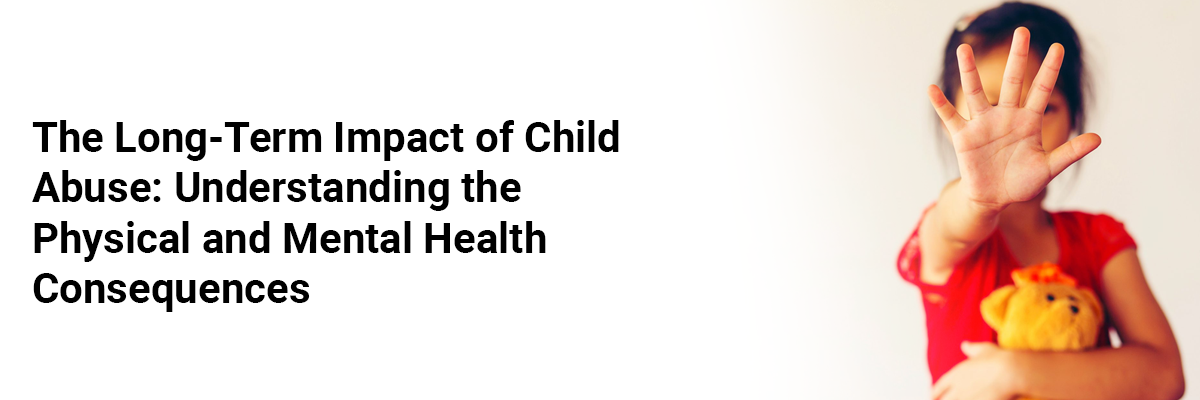
 Mrs. Mayuri Mathur
Mrs. Mayuri Mathur
The Long-Term Impact of Child Abuse: Understanding the Physical and Mental Health Consequences
Child abuse in India is a distressing reality that persists despite ongoing efforts to address it. The country grapples with various forms of child abuse, including physical, emotional, sexual, and neglectful treatment of children. During 2022, India experienced an alarming 8.7% rise in child abuse cases, totaling 162,000 incidents, according to the National Crime Records Bureau (NCRB). This surge occurred against the backdrop of COVID-19 pandemic-induced lockdowns, underscoring a troubling trend in crimes against children.
Children experiencing abuse or neglect can have long-term effects on their physical and mental health. These effects can impact them as they grow up and even affect their children in the future. Abuse or neglect can harm a child's brain development, leading to problems like low self-esteem, and they may turn to risky behaviors like substance abuse later in life. The effects can vary from person to person, influenced by factors like the child's age, the type and severity of the abuse, and their relationship with the abuser.
Effect of Abuse on Children
Physically, abuse or neglect can cause immediate harm, such as brain damage from head injuries. But there are also long-term physical consequences that may take time to show up. Childhood maltreatment is linked to a higher risk of various health problems in adulthood, including diabetes, lung disease, malnutrition, vision problems, heart issues, and many others. Additionally, abuse and neglect can affect the development and functioning of specific brain areas.
Psychologically, child abuse and neglect have significant impacts on victims. Researchers have identified connections of child abuse and neglect with childhood psychiatric disorders, teenage mental health issues, and mental health issues in youth and adults. Abuse during childhood can have the following psychological outcomes:
• Impaired executive functioning and cognitive skills: Maltreatment can cause childhood psychological disorders and disrupt brain development, leading to deficits in executive functions such as working memory, self-control, and cognitive flexibility (the capability to view things from various viewpoints). Maltreated children also risk experiencing cognitive difficulties, including learning and attention problems.
• Poor mental and emotional health: Childhood maltreatment significantly impacts every stage of life, including pediatric mental health, teenagers' mental health, adolescents' mental health as well as mental health in youth. It increases the risk of depression, anxiety, and other psychiatric disorders in adulthood. Studies have found that adults with a history of adverse childhood experiences (ACEs) are more likely to attempt suicide. In addition, people who have suffered childhood abuse and have major depression may not respond well to antidepressant treatment. This is especially true if the abuse happened when they were seven years old or younger.
• Attachment and social difficulties: Infants who have suffered maltreatment and subsequent disruptions in early caregiving, such as those in foster care, may develop attachment disorders. Disorders like these can have a negative impact on a child's capacity to develop healthy relationships with peers, build social connections, and have romantic relationships in the future. Furthermore, children who experience abuse or neglect are more prone to developing antisocial traits as they grow up, which can contribute to criminal behavior in adulthood.
• Post-traumatic stress: Childhood abuse or neglect can hurt children's mental health, and they may develop post-traumatic stress disorder (PTSD), characterized by symptoms such as recurrent reliving of traumatic events related to the maltreatment, avoidance of reminders of the abuse, feelings of fear, anger, guilt, or shame, easily triggered startle response, and heightened vigilance, irritability, or mood changes. Children who have PTSD may develop depression, suicidal tendencies, substance abuse, and oppositional or defiant behaviors that can continue into their adult years. This can negatively impact their academic performance and make it difficult for them to form and sustain meaningful relationships.
Child abuse and neglect have far-reaching psychological consequences that can impact individuals well into adulthood, affecting their emotional well-being, social interactions, and overall functioning in various areas of life.
Abuse in Childhood and physical health in Adulthood
Adults who have experienced physical or sexual abuse in their childhood report various physical symptoms more frequently than those who haven't experienced abuse. These symptoms can include nightmares, back pain, severe headaches, pelvic or genital pain, eating issues like binging or vomiting, frequent tiredness, sleep problems, stomach or abdominal pain, vaginal discharge, breast pain, difficulty swallowing, loss of appetite, urination problems, diarrhea, constipation, chest pain, face pain, frequent bruises, and shortness of breath. Moreover, individuals who have experienced neglect or maltreatment in childhood are more likely to become abuse victims in adulthood.
The bottom line
It's important to understand that child abuse and neglect have severe and long-lasting effects on a person's physical and mental well-being. These effects can impact their emotional state, ability to connect with others, and overall functioning in various aspects of life. Henceforth pediatric psychiatric consultation is crucial to such cases.
In addition, child abuse and neglect have profound consequences for both individuals and society as a whole. The effects can be severe and long-lasting, leading to detrimental outcomes such as increased reliance on services and greater involvement in the juvenile and criminal justice systems. Working together can combat child maltreatment, protect children, and create a safer and healthier environment for future generations.

Mrs. Mayuri Mathur
Mrs. Mayuri Mathur is a Senior Medical Writer (Patient education and digital) and seasoned content creator with a rich tapestry of expertise spanning over ten years. With a diverse background in content creation, she brings a wealth of experience to the table, from crafting insightful medical articles to developing comprehensive patient education materials, dynamic press releases, and captivating brochures and website content. Throughout her illustrious career, she has demonstrated an exceptional knack for distilling complex medical concepts into easily understandable content, making her a trusted resource for both professionals and lay audiences alike. Her meticulous attention to detail and innate creativity have enabled her to deliver content that not only informs but also engages and inspires. Whether elucidating intricate medical procedures or crafting compelling marketing materials, her versatility and dedication shine through in every project she undertakes. Her passion for writing, coupled with her profound understanding, makes her an invaluable asset to any team or project. In a constantly evolving digital landscape, where effective communication is paramount, Mrs. Mayuri Mathur stands out as a beacon of excellence, consistently delivering top-notch content that resonates with audiences across diverse platforms.

.png)

.png)
.png)


.jpg)








.jpg)


Please login to comment on this article